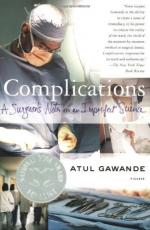|
This section contains 509 words (approx. 2 pages at 400 words per page) |

|
Complications: A Surgeon's Notes on an Imperfect Science Summary & Study Guide Description
Complications: A Surgeon's Notes on an Imperfect Science Summary & Study Guide includes comprehensive information and analysis to help you understand the book. This study guide contains the following sections:
This detailed literature summary also contains Topics for Discussion and a Free Quiz on Complications: A Surgeon's Notes on an Imperfect Science by Atul Gawande.
"Complications: A Surgeon's Note on an Imperfect Science" is a collection of stories and personal essays written by Dr. Atul Gawande, a surgical resident. Gawande describes his experiences in the field, in learning and interpreting medical mysteries and facing uncertainties, and the philosophical questions he encounters from these experiences.
In "Complications," Gawande lays out several ways in which medicine is imperfect and will continue to be imperfect. In Part I "How We Learn," Gawande discusses that medicine will always be prone to errors so long as it is performed by humans. Humans are not perfect, but striving to be perfect requires practice and learning. Learning, in turn, demands that mistakes be made. Gawande talks about his first surgical procedure and how his failed attempts improved each time before he was successful. Although Gawande dislikes making mistakes, he knows he will make them and realizes that the difference is what happens after they are made. Mistakes are learning opportunities themselves, as Gawande demonstrates as he retells a botched intubation that is reviewed during a meeting with the doctors to discuss unexpected outcomes. He also notes how doctors learn from each other—whether during a professional conference or from watching a good doctor fall.
Gawande discusses another way in which imperfection occurs—because there is still much that people and science cannot explain. He reviews such medical mysteries related to superstition, chronic pain, nausea, blushing and appetite. Doctors are always looking for a physical, logical, or scientific explanation of a problem. When no such answer explains, doctors are puzzled and sometimes question that the problem exists. Several of the patients he mentions discuss the lack of compassion and belief that existed without corroborating evidence. Through these stories, Gawande explores the connection between mind-body and challenges several popular medical beliefs and theories.
In the last part of the book, Gawande reveals how much of medicine is governed by uncertainties. Though people have tried to reduce the amount of uncertainty through the invention of tests such as autopsy and diagnostic MRIs, X-rays and CAT scans, the rate of misdiagnoses remains the same. Gawande explains that although diagnostic tests may be accurate, they still rely upon a person to order and assess it. Gawande lists several examples of research that demonstrated people are not always the best decision makers. Knowing this, Gawande debates the appropriateness of who should be the ultimate decision-maker in a person's care. He concludes that both patient and doctor should work together in order to ensure that the patient's best interests are in mind. Additionally, he details the case of one young woman, whose skin infection turns out to be caused by aggressive life-threatening bacteria. He discusses how, in this case, the logical course of action would have been the wrong one, and the difficulties doctors face in each decision.
In the end, Gawande realizes that encountering uncertainties in this field are sometimes the only constants. Doctors can equip themselves best by accepting the imperfections of medicine, but never failing to strive for perfection.
Read more from the Study Guide
|
This section contains 509 words (approx. 2 pages at 400 words per page) |

|



